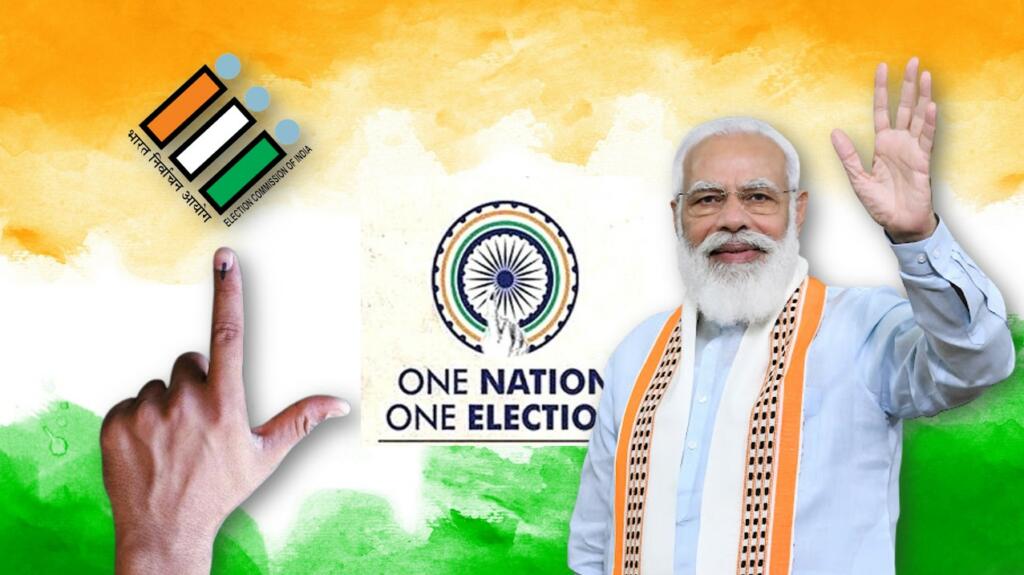- PM Modi and Election Commission are on board for One Nation One Election
- On the legal front, there is a need for change in Constitution, while on a political level, states need to be taken on board
- If carefully planned, the 2024 general elections can turn out to be a stepping stone towards the implementation of this dream
The fact that you can throw out a non-competent politician after every few years is the reason why elections are popular in Democracy. But it is also true that too many of these elections defeat the purpose for which they exist. One Nation One Election is the only solution to bypass this discrepancy.
PM Modi endorses One Nation One Election
PM Modi is in favour of conducting simultaneous elections in the country. PM Modi’s reservation about the multiple elections is that too much politics ends up hindering the people from looking at things from a non-political point of view. In January this year, PM Modi said that the continuous cycle of elections disrupts the developmental agenda and even if any government is trying to bring in some reforms, people try to find out possible political benefits to the party in power, which leads to developmental works taking a backseat.
In February, PM Modi again emphasised the need for change in election patterns. During an interview with ANI, he said, “Decide for once that there will be an election once every five years and everyone will contest it together. All the states and the Centre will go for elections at the same time and we will save money. Then you will never see ED or CBI.”
Election Commission is ready
In March this year, the Election commission indirectly endorsed PM Modi’s views on One Nation One Election. In an interview with ANI, Sushil Chandra, Chief Election Commissioner informed that Election Commission is ready to hold simultaneous elections along the lines of Prime Minister Narendra Modi’s call for ‘One Nation One Election.’
However, Chandra also cautioned that until required Constitutional changes are brought in, it would be impossible to effect that change. Emphasising the need for change, the Election Commissioner said, “An Assembly, which will not be able to complete the five-year term in the Assembly, will have to think about whether we can abolish it under the Constitution or we need to increase the tenure of Parliament for simultaneous elections in the country.”
Election Commissioner also pointed out that India’s streak of one nation one election was broken due to instability in governments at the state level. “According to the Constitution, all the elections should be held simultaneously. The parliament elections that are held since independence, three of them are simultaneous. It is only later that sometimes the Assembly was dissolved, sometimes parliament, which disturbed the schedule. One Nation One Election is a good suggestion but this needs a change in the constitution,” said Chandra
Read more: One nation, one election: One step closer to reality
PM Modi revived the demand for One Nation One Election
One Nation One Election is a noble idea that needs to be implemented as soon as possible. Though it is an age-old idea, the credit for reintroducing it in the public domain goes to PM Modi. He has been a vocal supporter of this idea. Since India is a quasi-federal nation, the change can be brought in only through the consensus of state governments. Building up for the 2019 general elections, speculations were rife that the idea could be tested on a small level by holding assembly by-elections in a few states along with the 2019 general elections.
However, despite the support of states like Odisha and Karnataka, states were not on equal footing and the idea was pushed to the backburner.
Read more: Naveen Patnaik backs PM Modi’s ‘One Nation, One Election’ initiative
2024 elections could prove to be a game-changer
It is again catching heat in the wake of the upcoming 2024 general elections. Starting from December 2022, 19 assembly elections are lined up to happen just before and after the 2024 general elections. From December this year, a total of 12 states are slated to contest elections within a one-year time frame. These include BJP ruled states like Madhya Pradesh, Himachal Pradesh, and Karnataka as well. If BJP can take its own states on board, then it will become easier for it to convince other states to conduct their elections in line with the dates of general elections.
Moreover, the dates for Sikkim, Andhra Pradesh, Odisha, and Arunachal Pradesh assembly elections in 2024 are expected to fall in close proximity to speculated dates of general elections. Due to the presence of Naveen Patnaik on the list of these states’ chief ministers, it would be easier for the Modi government to take them on board.
Read more: Why the opposition prefers Mamata and Nitish and not Naveen Patnaik against PM Modi
Similarly, Haryana, Maharashtra, Jharkhand, and Delhi are set for assembly elections in the months ranging from October 2024 to February 2025. Haryana can come on board, while BJP will have the tedious task of bringing the other three states on board. But careful planning can be laid out to convince these states to dissolve their government a tad earlier than their stipulated times.
Read more: KCR dissolves Telangana Assembly: What it means for ‘One Nation, One Election
India is a vast country. There are already enough differences among people as well as on the top echelons of the polity. Too many elections only create more differences among voters as well as political parties. With One Nation One Election, political mudslinging will be minimised to a large extent. It has been tried in the past with remarkable success, there is nothing wrong with restarting this practice.
